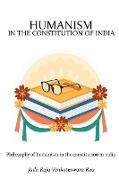- Start
- Philosophy of Humanism in the Constitution of India
Philosophy of Humanism in the Constitution of India
Angebote / Angebote:
INTRODUCTION Humanism is one of the dominant doctrines, which is influencing the contemporary man, both in the East and the West. Humanism considers man as the measure of all things and keeps man at the centre. It is a programme directed towards the realization of the inherent potentialities of man and is concerned with development welfare and happiness of man. Humanism is committed to the values of life and continues to be unrelenting quest for truth. It is a world view, a way of thinking without giving any vent to supernaturalism, dogmatism, authoritarianism or obscurantism which retards the human progress and man's initiative. Philosophy of humanism: The English word 'Humanism' has been derived from the Latin term 'Homo" which means human being. Thus literally speaking, humanism is the philosophy in which man occupies a central place. S. B. Roy elaborates: "Etymological meaning of humanism, however, is not the sufficient meaning of the term, it includes its historical usage as well. The use of a term in the historical tradition gradually unveils the different aspects of its meaning, Thus, in order to understand the full implication of the term 'Humanism' one must take into account its historical evolution. In this historical evolution whatever has been found to be.
Folgt in ca. 5 Arbeitstagen
